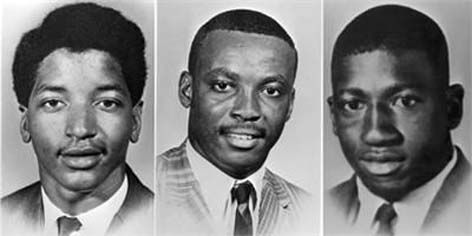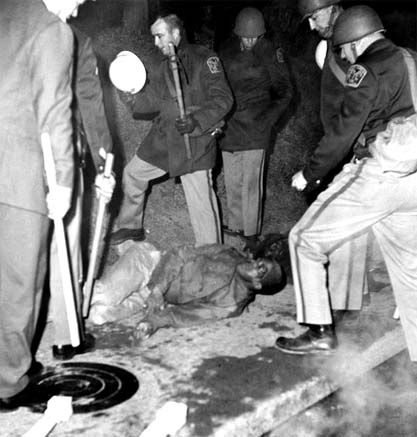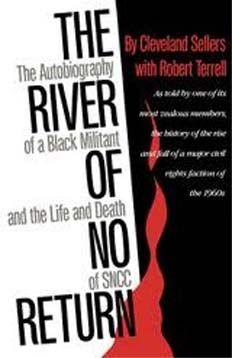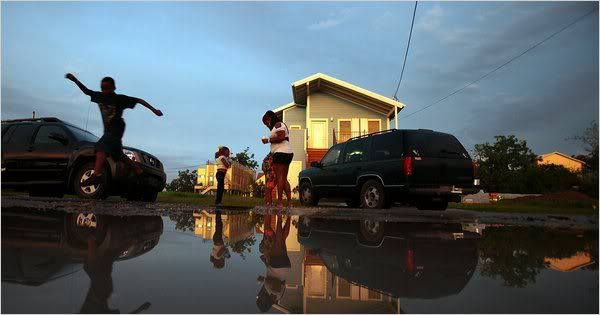
A Day of Remembrance: the Orangeburg Massacre
Commentary by Black Kos Editor Deoliver47
Today, Feb the 8th is the anniversary of what took place at South Carolina State University (SCSU) in Orangeburg in 1968. Three young men lost their lives, 28 were wounded (most shot in the back) a pregnant young woman lost her baby and a young activist Cleveland Sellers was railroaded into jail.
These are the young men who were murdered:
Henry Smith, Delano Middleton,and Samuel Hammond Jr.

Delano Middleton, an Orangeburg High School student, lays wounded on the campus of South Carolina State College on Feb. 8, 1968. AP
You all know about Kent State. Some of you may even know about Jackson State which took place 14 days after Kent State, leaving 2 students dead and 12 wounded.
Some of you may not have been alive at the time.
In 1968 I was a student at another historically black university, Howard University, where two months later students would stage the first major takeover of an HBC campus. We were engaged in community organizing, the Civil Rights Movement and against the Vietnam War. We knew that what had happened in Orangeburg could have happened to any of us.
We also knew that there would be no justice for the slain, no punishment of the murderers, and little attention would be paid in the national media to the plight of those in Orangeburg, or for that matter to what was done to black students anywhere.
That knowledge did not stop those involved from demanding justice. The survivors and their loved ones continue to tell the tale. Each year more people learn the truth about Orangeburg.
Reporter Frank Beacham sets the scene:
The setting was South Carolina State College (now University), one of two small black colleges located in Orangeburg, a mostly white, ultra-conservative community of 20,000 located about forty miles southeast of Columbia. Although S.C. State College and nearby Claflin University—with a combined enrollment of about 2,300 students—insured a substantial well-educated black population in the town, a social wall continued to divide the races. In 1968, white Orangeburg was a hotbed of segregationist radicalism—a center for organizations resisting the social change sweeping the South.
The S.C. State campus, made up of students from mostly poor and middle class black families, was a cultural world apart from the white neighborhoods surrounding it. The students had a rich legacy of civil rights activism, and, in 1968, there remained an undercurrent of tension over the second-class treatment the college was receiving from the state government. However, the conflict that led to the Orangeburg massacre began at a bowling alley. John Stroman, a black S.C. State senior from Savannah, Georgia, had a passion for bowling. All Star Bowling Lanes, the only bowling facility within forty miles of the campus, refused to admit black patrons. Its owner, Harry Floyd, believed that the presence of black bowlers would hurt his business. His stubborn refusal to serve black customers—including students from the local colleges—elevated the bowling establishment to a highly visible symbol of the remaining segregation in Orangeburg. A group of students, organized by Stroman, decided to stage a protest.
He goes into detail about not only the lead-up to the events, but to the whitewash that followed. Wish that I could copy the entire document here, but please go give it a full read.
An act of racism in a small college town leads to peaceful protest by frustrated black students. The governor, elected on a platform of racial moderation, responds with a vast show of armed force. Each side misreads the other, escalating the conflict. Then, in a peak of emotional frenzy, nine white highway patrolmen open fire on the students. In less than ten seconds, the campus turns into a bloodbath.Over four days in early February, 1968, this scenario played out in Orangeburg, South Carolina. On the final day, three black students were killed and 27 others wounded when the lawmen sprayed deadly buckshot onto the campus of South Carolina State College. Most of the students, in retreat at the time, were shot from the rear—some in the back, others in the soles of their feet. None carried weapons.
The killings occurred in a southern state heralded for its record of nonviolence during the civil rights era. In attempt to preserve its carefully-cultivated image of racial harmony, a web of official deceptions was created to distort the facts and conceal the truth about what happened in Orangeburg. The state's young governor, Robert E. McNair, claimed the deaths were the result of a two-way gun battle between students and lawmen. The highway patrolmen insisted their shooting was done in self-defense—to protect themselves from an attacking mob of students. At first, the state's cover-up worked. Later, it unraveled. Now, after 40 years, the story of Orangeburg continues to simmer unresolved in a twilight zone of blame and denial.
A film was made to document this history:
Scarred Justice: The Orangeburg Massacre 1968. (trailer)
Juan Gonzalez,from Democracy Now, who was an student activist at Columbia University during those days, and who in the following year(1969)became a leading member of the Young Lords Party did a retrospective:
1968, Forty Years Later: A Look Back at the Orangeburg Massacre When SC Police Opened Fire on Black Students Protesting Segregation
Orangeburg Massacre -- Survivors Tell Their Stories
Why don't we all know this history? Here's one answer:
Remembering the Orangeburg Massacre - South Carolina State University
Although historians devote attention to the student protests at the University of California - Berkeley and Columbia University, S.C. State is often ignored. Four students at Kent State University were killed May 4, 1970, two years after the incident at S.C. State, yet it gained far more attention and is often referred to as the first time protesting students were fired upon.
The Orangeburg Massacre is often left out of the history books. Advocates stress that this legacy must be told. "S.C. State didn't get the same attention as Kent State because our students were Black. It wasn't newsworthy," says Thomas Kennerly of Columbia, S.C.
Over the years, in South Carolina those who do remember have made sure to keep the events alive, for each generation of students who stand on the shoulders of those who died.
Dr. Cleveland Sellers, one of the survivors and the only one imprisoned as a result has never stopped being a living testimony to that history.
Cleveland Sellers was one of the first students to leave Howard University to work full time for civil rights and voter registration in the early 60's. He is currently the President of Voorhees College.
Orangeburg Massacre 40th Commemoration Ceremony
Cleveland Sellers speaks
Had Cleveland Sellers been killed that night in Orangeburg, he would not have lived to marry and raise a family. He would not have had three children. The youngest, his son Bakari, grew up to become the youngest member of the South Carolina Legislature.
We will never know what the lives of Henry Smith, Delano Middleton,and Samuel Hammond Jr would have been. They lie in graves. Silenced.
It was not until 1993 that Cleveland Sellers received a "pardon" from the State.
In 1968, Cleveland Sellers was arrested in connection with what would become known as the Orangeburg Massacre. Police allege Sellers instigated a confrontation between the law officers and the protesters, resulting in the death of three student protesters. Sellers, a former SNCC chairman, was convicted and spent several years in prison. In 1993 Sellers was pardoned by the Pardon Board of the State of South Carolina. The pardon freed Sellers to continue his academic career unimpeded by a felony record.
In 2008, the Post and Courier did a 4-part series on Dr. Sellers.
Warrior evolves into leader
I would suggest that you also read his book:
The River of No Return: The Autobiography of a Black Militant and the Life and Death of SNCC

Beacham closes his reportage with The Legacy of the Orangeburg Massacre, telling the story of young Bakari Sellers.
In 2006, when he decided to run for South Carolina's legislature against an 82-year-old white incumbent seeking his 25th year in office, Bakari was given little or no chance of victory. Yet, with the help of friends and fellow law students, he trudged door-to-door, knocking on 2,600 of them from morning until dark. The son of Cleveland Sellers pulled a major upset, winning the election by a margin of 1,954 to 1,591 votes. "It was a referendum on change," Bakari said. "It was about hope. My election has brought hope to a lot of people."
After the election, Bakari exploded to public attention—drawing public praise from national leaders that included Sen. Barack Obama, Sen. Hillary Clinton, former President Bill Clinton, and Rep. James Clyburn, the Democratic Majority Whip in the U.S. House of Representatives. He was identified as one to watch in the future. Though his campaign themes were targeted to better education, improved care for the elderly, and a promise to help his community out of a lingering economic depression, it was impossible for the residents of this poverty-stricken region not to see a determined young man carrying the torch for a legendary father and his contributions to America's civil rights movement. Unlike Robert McNair's restrained "member of the club" conservatism in the legislature, Bakari Sellers vowed to enter the white-dominated body "kicking, yelling and screaming" against the injustices that have long plagued his poor constituents. His people, victims of South Carolina's paternalistic politics, had waited long enough for real change.
One of Bakari's first chores was to call for, after almost four decades, a formal investigation of the Orangeburg Massacre. As Rep. Sellers, he sponsored a joint resolution that was introduced in the House of Representatives on March 29, 2007 to create a committee to review the events of that day and report to the General Assembly and the governor. Unlike his African-American contemporaries who have fled the poverty and lingering racism of rural, black South Carolina, Bakari, a 2005 graduate of Morehouse College, chose to stay home and "be part of something larger than me." That value, he readily admitted, was a key component in his unusual upbringing. For, in addition to his mother and father, his mentors were some of America's most prominent civil rights leaders.
Here is an interesting interview with Sellers:
Bakari Sellers interviewed by Julian Bond: Explorations in Black Leadership Series
So let us have a moment of silence here today on the porch. For those who died, and for those who will carry the struggle forward.
Those who forget are doomed to repeat.
We must ensure that we remember.
============================================================
News by dopper0189, Black Kos Managing Editor
============================================================

============================================================
As our nation focuses on how to climb out of a recession and how to overcome an unprecedented and unrelenting housing crisis, let’s not overlook another less visible crisis: our public housing crisis. Race-Talk: Proposed Public Housing Solution Opens New Choices and Opportunity.
=============================================================
As our nation focuses on how to climb out of a recession and how to overcome an unprecedented and unrelenting housing crisis, let’s not overlook another less visible crisis: our public housing crisis. It is important to take to heart President Obama’s State of the Union advice not to ignore the most vulnerable. Public housing is expressly designed to fill this critical last-ditch need. It is time to examine this system.
Decades of disinvestment have contributed to the deterioration and neglect of our existing public housing stock, resulting in the loss of nearly 150,000 units in the past fifteen years. The backlog of current repairs could cost upwards of $30 billion, far more than Congress provides annually for upkeep and maintenance. At the same time, the number of families who are homeless or in need of housing assistance has grown in the face of current economic challenges.
Even if our public housing was in excellent condition, the location of many of these units is troubling. Much of our public housing remains in areas that are isolated both economically and racially, with limited access to opportunity. Five decades of social science research have shown the overwhelming importance of housing to individual life chances. Housing is a key point of access to economic and educational opportunities for children and families: high-performing schools, safe places to play, employment, healthy food, financial services, health care providers, and supportive peer and civic networks, among others. Conversely, unstable, unsafe or racially and economically isolated housing has severely negative health and developmental impacts.
The Rental Housing Revitalization Act which was recently introduced by Congressman Keith Ellison of Minnesota has the potential to stem the loss of public housing units while simultaneously opening new choices in areas of opportunity for residents and reducing concentrated poverty. The bill would allow local public housing agencies to leverage public and private funds to repair and renovate public housing properties rather than relying on HUD’s annual contributions alone. This would improve the quality and condition of existing public housing rather than let it fall into irreversible disrepair. The measure would also give public housing residents a choice to remain in their current housing unit or to use a voucher to move near family, a better job, or better schools. Any vacated public housing unit would then remain available to another household.
============================================================
Conservatives have conveniently forgotten how Reagan used racial fears to advance his political ambitions. The Root: Why I Won't Celebrate Ronald Reagan's 100th Birthday
=============================================================
Like most African Americans old enough to shudder with revulsion when they remember Ronald Reagan's presidency, I won't be joining the hagiographical celebration of the late conservative saint's 100th birthday that is scheduled to take place this weekend. There will simply be too many lies.
The celebrations won't be talking about it, but neither the passage of time nor President Barack Obama's oft-stated admiration for Reagan's transformational politics can make me forget how the Gipper used the fears and resentments of angry white people to get elected.
I could make a long, long list of the signals Reagan sent to let racists know that they would have a friend in the White House. Among them was his decision -- urged by, among others, the affably bigoted former Mississippi Sen. Trent Lott -- to deliver the first major speech of his 1980 campaign in Philadelphia, Miss., where three civil rights workers were murdered in one of the 1960s' ugliest cases of racist violence. Reagan gave a ringing declaration of his support for "states' rights" -- code words for resistance to black advances, and clearly understood by white Southerners.
Then, as I wrote in a column for Time magazine some years ago, there was Reagan's attempt in 1981 to reverse a long-standing policy of denying tax-exempt status to private schools that practice racial discrimination and to grant an exemption to Bob Jones University, which at the time prohibited interracial dating and other sorts of race mixing.
True to their whitewashing of the Gipper's record on racial issues, his fans won't mention that when Lott suggested that Reagan's regime take BJU's side in a lawsuit against the Internal Revenue Service, Reagan responded, "We ought to do it." Two years later, the U.S. Supreme Court ruled that Reagan was dead wrong and reinstated the IRS's power to deny the university's tax exemption.
No, you won't hear any of that during this weekend's celebration. Or anything about Reagan's nasty insinuations about welfare queens or Martin Luther King Jr. supposedly being under the sway of the Communist Party.
Collective amnesia has set in.
============================================================

============================================================
One year after an earthquake devastated Haiti, much of the promised relief and reconstruction aid has not reached those most in need. In fact, the tragedy has served as an opportunity to further enrich corporate interests. Race-Talk: One year after Haiti earthquake, corporations profit while people suffer
============================================================
One year after an earthquake devastated Haiti, much of the promised relief and reconstruction aid has not reached those most in need. In fact, the tragedy has served as an opportunity to further enrich corporate interests.
The details of a recent lawsuit, as reported by Business Week, highlights the ways in which contractors – including some of the same players who profited from Hurricane Katrina-related reconstruction – have continued to use their political connections to gain profits from others’ suffering, receiving contacts worth tens of millions of dollars while the Haitian people receive pennies at best. It also demonstrates how charity and development efforts have mirrored and contributed to corporate abuses.
Haiti's unspent billions examined - BusinessWeek
============================================================
In the BBC's series of viewpoints from African journalists, Nigerian Sola Odunfa thinks it is high time African leaders redraw the continent's borders. BBC: African viewpoint: Blood and borders
============================================================
Blood, blood, blood all over Africa but, I ask, when will it end?
Over the weekend the people of Jos and some villages nearby were arranging for the burial of 14 more people killed in the long-running ethno-religious crisis in Nigeria's north-central region.
The total number of people slain in the past year tops 1,000, with many more injured.
I won't mention trouble-spots like Sudan, Niger, Somalia and the whole of central Africa, but focus on Ivory Coast as senior Nigerian government officials are seeking crucial international support for the use of military force to resolve the seemingly intractable political and electoral crisis there.
Lesotho, which is ethnically homogeneous, is relatively peaceful
You may remember that President Laurent Gbagbo and his political foe President-elect Alassane Ouattara are entrenched in a fierce battle over the result of the 28 November election.
The electoral agency declared Mr Ouattara the winner but Mr Gbagbo will not step down.
It is not as if Mr Gbagbo's action constitutes a grave crime akin to the imposition of the death penalty on poor Ivorians - the poor and helpless are always the victims when their rulers belch - but his peers on the continent are apparently seething with anger at not only his stubbornness but also his naivety in allowing an opponent to win an election.
Therefore West African leaders have declared that Mr Gbagbo must quit office for Mr Ouattara or face the bombardment of his palace and wherever else he may be suspected to be holed up.
Other African leaders know it but they won't talk about it for fear of bringing the ghosts in their own lockers back to life. Other African countries are likely to see their own future in the current political crisis in Ivory Coast.
Mr Gbagbo, a Bete from the west of Ivory Coast, draws his support from ethnic groups in the west and southern Akan groups that live around the coast, including in the main city Abidjan.
Mr Ouattara is a northerner. There are some southerners who do not accept northerners as true Ivorians. The problem of Ivory Coast at its most simple is: North versus south.

Sola Odunfa
=============================================================
Bob Marley was born in Nine Mile in St. Anne Parish, Jamaica on February 6th 1945
=============================================================
============================================================

============================================================
Results of the 2010 census show that the population of New Orleans is 29 percent smaller than it was a decade earlier. New York Times: Smaller New Orleans After Katrina, Census Shows
============================================================
The Census Bureau reported on Thursday that 343,829 people were living in the city of New Orleans on April 1, 2010, four years and seven months after it was virtually emptied by the floodwaters that followed the hurricane.
The numbers portray a significantly smaller city than in the previous census, in 2000, though it should be said that New Orleans had been steadily shrinking even then. In 1990, it was the 24th-biggest city in the country, in 2000, the 31st, and now it has surely dropped from the top 50.
The latest figure is lower than estimates cited widely by many here in recent months. It is lower, by roughly 10,000, than the official census estimate in the summer of 2009.
"It’s not an unqualified good thing to have big numbers," said Mark VanLandingham, a professor at Tulane University who has expressed frustration with frequent calls from local officials, sometimes successful, for the Census Bureau to raise the city’s population estimate. "It made it very difficult to figure out what was actually going on."
The census findings reveal some other changes in the population, as well.
According to Andrew A. Beveridge, a Queens College sociologist who analyzed the census results for The New York Times, the city has roughly 24,000 fewer white residents than it did 10 years ago, though the proportion of the white population has grown to 30 percent.
The city has 118,000 fewer black residents. New Orleans, once more than two-thirds black, is now less than 60 percent black.
There are 56,193 fewer children, a drop of nearly 44 percent.
The movements in the region can be seen with some clarity as well. St. Tammany Parish, a suburban refuge for many New Orleanians after the storm, grew by nearly a quarter. St. Bernard Parish, which is downriver from the city and was almost completely overwhelmed by the floodwaters, shrank by nearly half.

Mario Tama/Getty Images
The aftermath of a rain storm, not a hurricane, in front of a new home in the Lower Ninth Ward last summer.
============================================================
Help me out here. This is an important subject but also one of the dumbest names/labels I have ever heard. Times of Trenton Understanding 'Neo-African-Americans
=============================================================
As students and members of the community enjoyed such typical West African dishes as fried plantains and jollof rice in the Carl A. Fields Center on Wednesday evening, Princeton University kicked off Black History Month with a screening of Kobina Aidoo's documentary, "The Neo-African-Americans."
Aidoo, who was born and raised in Ghana, introduced his 2008 film, which addresses the complexities of the evolving African-American narrative.
"We think of the African-American narrative as one of struggle, of breaking down walls in America, but the new narrative is of jumping through windows in America, of the black immigrant," said Aidoo.
According to Aidoo, the mentality of overcoming obstacles is often specific to native African-Americans -- United States citizens of African descent -- while African immigrants to America see the United States as a land of opportunities, or "windows." He attributed much of the tension between the two groups to this difference in perception.
"We have to understand that other perspective before we can have a real conversation. Otherwise we're imposing our world views on someone else," he said.
============================================================

============================================================
South Side soul food legend Army & Lou’s closes. It was the late Mayor Harold Washington’s favorite restaurant — the booth where he always sat still bears his name. One of the oldest Black-owned restaurants in the Midwest. Sun Times: South Side soul food legend Army & Lou’s closes
============================================================
It was the late Mayor Harold Washington’s favorite restaurant — the booth where he always sat still bears his name. And its storied history goes beyond feeding the grass-roots political movement that elected the city’s first black mayor.
At its original Black Metropolis location, it fed the leader of another movement: the Rev. Martin Luther King Jr. in the ’60s.
But South Side soul-food legend Army & Lou’s, 422 E. 75th St., thought to be the oldest black-owned restaurant in the Midwest, closed its doors for the last time Sunday.
"It’s really just due to the economy. People are not eating out as much," said one of the five partners, Goldie McDuffie. "We had to close. We’ll see what happens in the future."
For 65 years, Army & Lou’s has fed celebrities, politicians, business moguls and others who slid into its red linen-tableclothed booths for greens and ham hocks, catfish, chitterlings and peach cobbler. Celebs ranged from Cab Calloway to Muhammad Ali to former U.S. Sen. Charles Percy.

============================================================

============================================================
A CDC study shows that the virus's burden on blacks is "severe and disproportionate," and the explanation isn't simple. The Root: HIV and African Americans: What's Behind the Devastating Statistics?.
============================================================
New data collected by the U.S. Centers for Diseases Control and Prevention reveal that black men have eight times the rate of HIV diagnosis as white men, and the likelihood that a black woman will be infected is 19 times greater than that of her white counterparts.
The news is terrible, but being appalled isn't going to solve the problem. So what is going on?
USA Today reports that experts point to a complicated and troubling web of reasons for these skewed numbers, including the following:
====================================================================
Voices and Soul

by Justice Putnam
Black Kos Poetry Editor
I had a conversation after the Super Bowl, Sunday, with a white progressive friend about Obama's pre-Super Bowl interview with O'Reilly. I appreciate this particular friend's tactic of playing Devil's Advocate; but it has gotten tiresome over the years; to the point I've accused this friend of actually advocating for his arguments. Regardless, he is intent on finding common ground with whatever opposition so that advances can be made, no matter how incremental; and it is that incrementalism that has always bothered me.
Where I saw O'Reilly barely able to temper his disdain for Obama, my friend saw O'Reilly has polite to a fault. The conversation devolved from there. We then discussed Fox News in general; I taking the position of Fox as being a powerful propaganda arm of the GOP; my friend pointing out evidence that is not true. We then debated about a Woman's Right to Choose; though a liberal, he has always been against abortion. He's a vegetarian and deems all life sacred, I will hand it to him, he does have some intellectual integrity; unlike my more reactionary acquaintances who oppose abortion, my friend also opposes the Death Penalty. He takes issue with, what he calls my, "inflammatory rhetoric", that I cannot expect to sway the anti-abortionists if I insist on referring to their position as "forced birth". Of course, calling someone a murderer for saving her own life is somehow not inflammatory. Regardless, if a law was passed to stop funding or treatment for any aspect of men's health, he would be at the front of whatever protest there was; yet, somehow, a microscopic mass of cells in a woman's womb can be more important than the woman. He doesn't exactly put it that way, but that is what I get every time we have this argument.
He then went on to discuss the advances racial minorities have achieved over the years, that by attrition, true freedom will occur; I brought up the anti-brown people laws passed and the insane numbers of minorities incarcerated to show that this incrementalism is not the success he insists.
My friend voted for Obama and considers him a great President; on that we agree. So how is it that two people who claim to be of the same persuasion so mightily disagree with the direction and success of reforms?
He sees the irrevocable change of rocks being worn away by the crashing of the sea; it may not happen in our lifetime, but change will indeed occur. I see that the rocks need to be smashed with sledge hammers; that change and freedom in the future mean little when folks are suffering now.
We may be friends, we may have the same concerns for the well being of the individual; and yet I cannot accept his safety in incrementalism. The gates need to be crashed and the walls of oppression need to be made to tumble down.
Waiting for Time to wear away oppression has never worked for those living in oppression; and it also is proved their great-great-great grandchildren won't experience the freedom that the argument of Time seems to assure.
We may have a Black President, as my friend points out as evidence of the great strides we've made; but when american latino families are murdered by white nationalist vigilantes, when black men and women are incarcerated in astronomical numbers, when income and housing inequality, when segregation are still prevalent; having a Black President is somewhat then, like a nice shiny ribbon on a gift.
The package looks nice, but the hate contained within is not negated by the beauty of the bow.
Going along to get along has never worked.
Booker T. and W.E.B.
"It seems to me," said Booker T.,
"It shows a mighty lot of cheek
To study chemistry and Greek
When Mister Charlie needs a hand
To hoe the cotton on his land,
And when Miss Ann looks for a cook,
Why stick your nose inside a book?"
"I don’t agree," said W.E.B.,
"If I should have the drive to seek
Knowledge of chemistry or Greek,
I’ll do it. Charles and Miss can look
Another place for hand or cook.
Some men rejoice in skill of hand,
And some in cultivating land,
But there are others who maintain
The right to cultivate the brain."
"It seems to me," said Booker T.,
"That all you folks have missed the boat
Who shout about the right to vote,
And spend vain days and sleepless nights
In uproar over civil rights.
Just keep your mouths shut, do not grouse,
But work, and save, and buy a house."
"I don’t agree," said W.E.B.,
"For what can property avail
If dignity and justice fail.
Unless you help to make the laws,
They’ll steal your house with trumped-up clause.
A rope’s as tight, a fire as hot,
No matter how much cash you’ve got.
Speak soft, and try your little plan,
But as for me, I’ll be a man."
"It seems to me," said Booker T.—
"I don’t agree,"
Said W.E.B.
--Dudley Randall
=====================================================================
The Front Porch is now open.
Grab a chair, a rocker or a seat on the glider. Sit and chat with us for a while.


